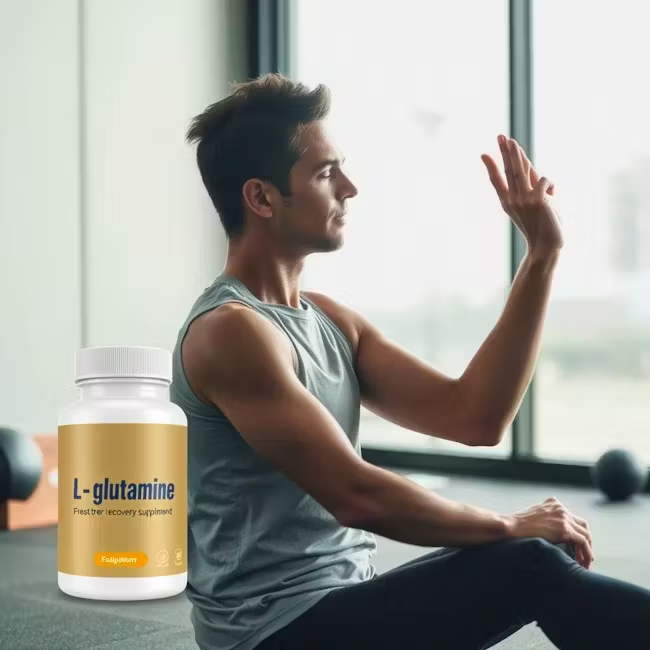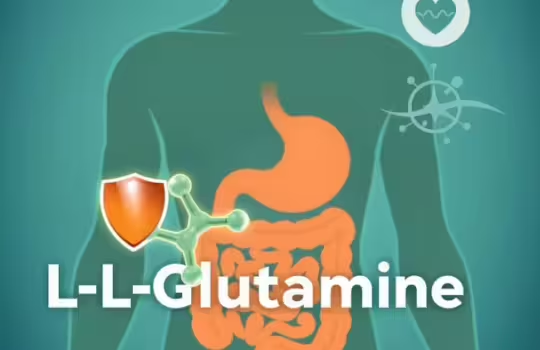Are you tired of feeling worn out and sore after a tough workout? Delayed Onset Muscle Soreness (DOMS) can be a major setback for athletes and fitness enthusiasts. But what if you could reduce muscle soreness and speed up your recovery time? L Glutamine, a naturally occurring amino acid, has been shown to play a crucial role in exercise recovery and muscle health. In this article, we’ll explore the benefits of L Glutamine, how it works, and provide you with practical tips on how to use it to enhance your exercise recovery and reduce muscle soreness.
1. What is L Glutamine and How Does it Support Exercise Recovery?
L Glutamine is an amino acid, one of the building blocks of protein that plays a crucial role in various bodily functions, including exercise recovery and muscle growth. It is the most abundant amino acid in the body, making up approximately 60% of the amino acid pool in the muscles. L Glutamine is naturally produced by the body, but during intense exercise, the body’s stores can become depleted, leading to muscle fatigue, soreness, and decreased performance.
Research has shown that supplementing with L Glutamine can help to rapidly replenish muscle stores, reducing muscle damage and soreness after exercise. This is especially important for athletes and individuals who engage in high-intensity, long-duration activities, as it can improve their overall performance and reduce recovery time. L Glutamine also has anti-inflammatory properties, which can help to reduce muscle inflammation and oxidative stress caused by intense exercise.
Another way L Glutamine supports exercise recovery is by promoting gut health. The gut is often referred to as the “second brain” of the body, and L Glutamine is essential for maintaining the integrity of the gut lining. During intense exercise, the gut can become compromised, leading to digestive issues and impaired immune function. Supplementing with L Glutamine can help to support gut health, reducing the risk of digestive problems and immune system suppression.
2. The Science Behind L Glutamine’s Role in Exercise Recovery
When it comes to exercise recovery, the role of L Glutamine cannot be overstated. This amino acid plays a critical part in the body’s response to physical stress and is essential for maintaining muscle function and immune system health. But how exactly does L Glutamine support exercise recovery? To answer this question, we need to delve into the science behind its effects on the body.
During intense exercise, the body’s stores of L Glutamine are depleted, and the amino acid is released into the bloodstream. This increase in circulating L Glutamine triggers a response in the immune system, which helps to reduce inflammation and promote recovery. L Glutamine also plays a crucial role in maintaining the integrity of the gut lining, which is often compromised during intense exercise. By supporting the health of the gut, L Glutamine helps to prevent the translocation of toxins into the bloodstream, reducing the risk of illness and infection.
Furthermore, L Glutamine has been shown to regulate the expression of genes involved in muscle protein synthesis, helping to promote muscle growth and repair. This is especially important during periods of intense exercise, when muscle damage is more likely to occur. By supporting muscle protein synthesis, L Glutamine helps to ensure that muscles are able to recover and adapt to the demands placed on them.
In addition to its effects on the immune system and muscle function, L Glutamine has also been shown to reduce oxidative stress and inflammation in the body. This can help to reduce muscle soreness and improve overall recovery after exercise. By understanding the science behind L Glutamine’s role in exercise recovery, we can see why this amino acid is such an essential component of any recovery strategy.
3. Benefits of L Glutamine for Muscle Soreness and Delayed Onset Muscle Soreness (DOMS)
L Glutamine has been shown to have numerous benefits for individuals who engage in regular exercise, particularly in reducing muscle soreness and Delayed Onset Muscle Soreness (DOMS). When you exercise, you cause micro-tears in your muscles, which can lead to inflammation and soreness. L Glutamine can help to reduce muscle damage and inflammation, allowing your muscles to recover faster and more efficiently.
Reduced muscle soreness is one of the most significant benefits of L Glutamine supplementation. Studies have shown that L Glutamine can reduce muscle soreness by up to 40% compared to a placebo. This is especially important for athletes who engage in high-intensity exercise, as it can help to improve performance and reduce downtime. Additionally, L Glutamine can help to improve joint health and reduce the risk of injury, making it an essential supplement for anyone who engages in regular exercise.
L Glutamine can also help to enhance recovery by reducing the amount of time it takes for your muscles to recover after exercise. This is because L Glutamine can help to promote muscle protein synthesis, which is essential for muscle growth and repair. By promoting muscle protein synthesis, L Glutamine can help to reduce muscle breakdown and promote muscle growth, making it an essential supplement for anyone looking to improve their athletic performance.
4. How to Choose the Best L Glutamine Supplement for Your Needs
When it comes to selecting the best L Glutamine supplement for your needs, there are several key factors to consider. With so many options available on the market, it can be overwhelming to make an informed decision. However, by understanding what to look for in a high-quality supplement, you can ensure that you’re getting the most out of your L Glutamine.
Check the ingredient label for the presence of pharmaceutical-grade L Glutamine, which is the most effective and bioavailable form. Be wary of supplements that contain fillers, artificial flavors, or other unnecessary ingredients that can dilute the potency of the L Glutamine.
Look for a supplement that is manufactured by a reputable company with a history of producing high-quality products. Research the company’s manufacturing process, quality control measures, and customer reviews to ensure that you’re getting a product that is safe and effective.
Consider the dosage and serving size to ensure that it aligns with your needs. A typical serving size of L Glutamine is between 5-10 grams, so look for a supplement that provides this amount per serving.
Check for third-party testing and certifications such as NSF International or Informed-Choice, which can provide assurance that the supplement meets certain standards for quality and purity.
Read reviews and ask for recommendations from friends, family, or healthcare professionals who have experience with L Glutamine supplements. This can provide valuable insights into the effectiveness and safety of a particular supplement.
By taking the time to carefully evaluate these factors, you can choose the best L Glutamine supplement for your needs and achieve optimal results.
5. Dosage and Timing: When to Take L Glutamine for Optimal Results
When it comes to taking L Glutamine for exercise recovery and muscle soreness, timing and dosage are crucial to achieve optimal results. While individual needs may vary, research suggests that a dose of 5-10 grams of L Glutamine per day is effective for most people. However, some studies have used higher doses of up to 20 grams per day.
To maximize the benefits of L Glutamine, it’s recommended to take it at specific times of the day. Immediately after exercise is an ideal time to take L Glutamine, as it can help to replenish energy stores and support muscle recovery. Additionally, taking L Glutamine before bedtime can also be beneficial, as it can help to promote muscle growth and repair during sleep.
Another important consideration is the duration of L Glutamine supplementation. While some studies have shown benefits with short-term use, others have found that longer-term supplementation is more effective. Aim to take L Glutamine for at least 4-6 weeks to see noticeable improvements in muscle recovery and soreness.
It’s also worth noting that L Glutamine can be taken in different forms, including capsules, tablets, and powders. L Glutamine powder is often preferred by athletes and bodybuilders, as it can be easily mixed with water or other beverages and taken on-the-go.
Ultimately, the key to achieving optimal results with L Glutamine is to listen to your body and adjust your dosage and timing accordingly. Experiment with different dosages and timing to find what works best for you and your fitness goals.
6. Combining L Glutamine with Other Supplements for Enhanced Exercise Recovery
When it comes to optimizing exercise recovery, combining L glutamine with other supplements can have a synergistic effect, leading to enhanced results and faster muscle repair. Protein powder, for instance, is a popular choice among athletes and bodybuilders, as it provides essential amino acids that support muscle growth and repair. Taking L glutamine with protein powder can help promote muscle protein synthesis, reducing muscle soreness and improving overall recovery.
Another supplement that pairs well with L glutamine is creatine monohydrate. Creatine has been shown to increase muscle strength and endurance, while L glutamine can help mitigate muscle damage and inflammation. This combination can be particularly effective for high-intensity athletes who require rapid recovery between workouts.
Additionally, branch-chained amino acids (BCAAs) can be combined with L glutamine to further enhance recovery. BCAAs, consisting of leucine, isoleucine, and valine, can help reduce muscle damage and promote muscle growth. When taken with L glutamine, BCAAs can create a powerful recovery cocktail that supports muscle repair and reduces muscle soreness.
When combining L glutamine with other supplements, it’s essential to consider your individual needs and goals. Be sure to consult with a healthcare professional or registered dietitian to determine the best supplement stack for your specific requirements. By combining L glutamine with other evidence-based supplements, you can take your exercise recovery to the next level and achieve your fitness goals faster.
7. Maximizing Your Results: Tips for Effective L Glutamine Use and Exercise Recovery
To get the most out of L Glutamine and enhance your exercise recovery, it’s essential to combine it with a well-structured training and nutrition plan. Here are some key tips to maximize your results:
Stay Hydrated – Adequate hydration is crucial for optimal L Glutamine absorption and utilization. Aim to drink at least 8-10 glasses of water per day, and make sure to drink a full glass of water with your L Glutamine supplement.
Balance Your Macronutrients – Ensure you’re consuming a balanced diet that includes protein, carbohydrates, and healthy fats. This will help support muscle growth and recovery, allowing L Glutamine to work more effectively.
Time Your Workouts Correctly – Try to schedule your workouts at the same time every day, and take your L Glutamine supplement within 30-60 minutes after your workout. This will help promote muscle recovery and reduce muscle soreness.
Get Enough Rest and Sleep – Adequate rest and sleep are critical for muscle recovery and growth. Aim for 7-9 hours of sleep per night, and take rest days as needed to allow your muscles to recover.
Monitor Your Progress – Keep track of your workouts, nutrition, and supplement routine to monitor your progress. Adjust your routine as needed to optimize your results.
Combine with Other Supplements – Consider combining L Glutamine with other supplements like protein powder, creatine, and branched-chain amino acids (BCAAs) to enhance your exercise recovery and muscle growth.
By following these tips, you can maximize the effectiveness of L Glutamine and enhance your exercise recovery, allowing you to train harder and achieve your fitness goals faster.

